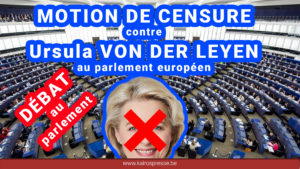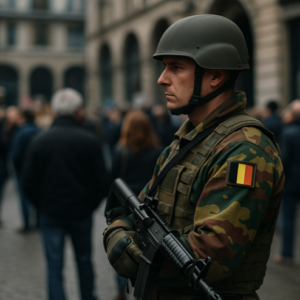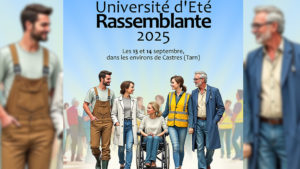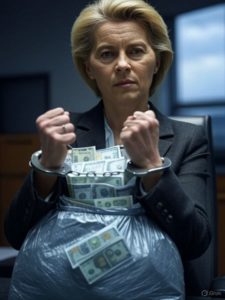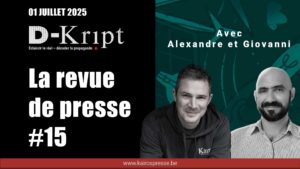La question du 11-Septembre divise, et brouille de nombreux repères politiques et idéologiques. Lorsque Noam Chomsky, le dissident anti-impérialiste sans doute le plus écouté au monde, a entériné la version des faits présentée par les autorités américaines, beaucoup y ont perdu leur latin. Et lorsqu’en Europe, la gauche de la gauche lui a emboîté le pas, de nouveaux clivages se sont dessinés autour de cette question, avec l’apparition d’intellectuels droitistes qui, eux, s’emparaient sans complexe de l’affaire. Pour remonter près de la source et comprendre le désintérêt, voire l’appréhension de la gauche face à cette question, Kairos a rencontré Jean Bricmont, physicien et intellectuel anti-impérialiste. Considéré souvent comme le porte-parole de Chomsky en Europe (ce dont il se défend), sa pensée est néanmoins très proche de celle du célèbre linguiste.
Kairos: La première fois que j’ai entendu Noam Chomsky évoquer le 11-Septembre, parlant d’une éventuelle complicité américaine, il disait: « Who cares? » (« On s’en fiche. ») Ce qui m’a interpellé là-dedans, c’est que c’est à travers les livres de Chomsky que j’ai, avec beaucoup d’autres, appris à regarder au-delà des apparences, à reconnaître les opérations sous fausse bannière, comme on les appelle. C’est tout de même lui qui débusque toujours les coups fourrés de l’Histoire. Partagez-vous son avis ?
Jean Bricmont: Non, ce n’est pas tellement qu’il débusque les coups fourrés. La pensée de Chomsky, c’est quand même une analyse de l’idéologie, ce qui est très différent. Et c’est toujours basé sur des faits officiels. Prenons un exemple qui me touche particulièrement, parce que c’est ce qui m’a marqué politiquement, c’est la guerre du Vietnam. Ça a commencé pour de bon avec le fameux incident du Golfe du Tonkin. Je ne suis pas persuadé que c’était un coup monté des Américains. Peut-être qu’ils ont sincèrement cru être attaqués, mais la question à poser, c’est de savoir si cela légitimait les bombardements. Qu’est-ce qu’ils faisaient si près des côtes vietnamiennes ? Qu’est-ce qu’ils avaient fait depuis 58, ou même depuis le sabotage des accords de Genève? Pour moi, tout ça, c’est une analyse politique.
Alors si on prend par exemple la guerre en Afghanistan: peu importe qu’il y ait eu attaque extérieure ou coup monté de l’intérieur le 11-Septembre, je ne suis pas d’accord qu’elle soit légitime, et celle en Irak encore moins. Donc cela ne dépend pas du fait de savoir s’il y a eu des complicités intérieures.
K: D’accord, mais pour beaucoup de gens, ça fait un monde de différence. Et à ce titre-là, si une complicité intérieure était démontrée, ça changerait beaucoup.
JB: Ça changerait, oui, mais la question est de savoir dans quelle mesure je dois m’y intéresser. Je peux m’y intéresser pour deux raisons. L’une serait purement intellectuelle, mais ce n’est pas le cas ici. L’autre est politique, et là, je pense que l’intérêt politique de cette question est très faible, pour la raison suivante : les ‘truthers’ du 11-Septembre disent qu’il faut une nouvelle enquête. C’est une revendication concrète, mais qui m’apparaît tout à fait utopique vu que cette enquête serait effectuée par les gens au pouvoir actuellement, qui sont tous d’accord avec la version officielle. Si par miracle, cela arrivait, elle donnerait les mêmes résultats. Donc c’est une revendication qui ne me parle pas, personnellement. La revendication sur laquelle je suis entièrement d’accord avec des truthers et sur laquelle je n’ai aucun problème avec eux, c’est : unissons-nous contre les guerres, qu’elles soient humanitaires ou non. Qui peut le plus, peut le moins: si on était capable de montrer que le 11 septembre est un inside job, alors il me semble qu’on devrait être capable d’arrêter les guerres.
K: N’est-ce pas ce que Chomsky et ses amis essaient de faire depuis 40 ans, et n’y a‑t-il pas eu un énorme recul de ces combats-là à partir du 11-Septembre? Vous écrivez: « Il serait possible de créer un mouvement en faveur du retrait des troupes étrangères d’Afghanistan (où la guerre est clairement perdue), contre l’extension de l’Otan, ou pour l’arrêt du soutien à Israël. » Depuis combien de décennies est-ce qu’on essaie de faire ça? Ce combat est-il en progrès ou en recul?
JB: Non, moi je pense plutôt que c’est le développement de l’idéologie de l’intervention humanitaire, dans les années 80 et 90, qui a saboté certains efforts à gauche. C’est cela qui joue en Syrie et en Libye, par exemple, ce n’est pas le 11-Septembre. Pour ce qui est du 11-Septembre, ça a été exploité pour faire la guerre en Irak, et là il y a eu une opposition massive, plus importante que jamais.
K: Et qu’a‑t-elle donné?
JB: Rien dans l’immédiat. Mais c’est vrai que maintenant, l’impopularité de cette guerre fait que les Américains se retirent – pas totalement, mais plus ou moins. Et ils hésitent à intervenir massivement en Syrie.
K: Mais s’il n’y avait pas eu ce mouvement contre la guerre, ils se seraient enlisés malgré tout, non? L’impopularité vient aussi de cet enlisement. Alors à quoi a servi cet énorme mouvement, que vous appelez encore de vos vœux? Il n’a pas empêché la guerre, et il n’a pas favorisé son impopularité.
JB: C’est comme la guerre du Vietnam, qui n’a pas été arrêtée par le mouvement contre la guerre, mais principalement par les Vietnamiens, les revers militaires. Les guerres ne deviennent vraiment impopulaires que lorsqu’elles tournent mal. Mais d’un autre côté, les opinions changent par rapport à Israël, donc ça a un certain effet. On peut toujours espérer que l’action idéologique a un effet, même si elle n’est pas l’aspect essentiel.
K: Mais est-ce que les opinions changent grâce à l’action idéologique, ou à cause des excès d’Israël qui deviennent de plus en plus évidents ?
JB: Les deux, et principalement le deuxième. Mais je ne vais pas aller en Israël pour participer à ces excès, et je ne vais pas rejoindre Al-Qaïda en Irak… Je fais ce que je peux. Mais encore une fois, si les gens pensent que c’est plus efficace de se concentrer sur le 11-Septembre, libre à eux de le faire. Moi, je ne le pense pas, en ce qui me concerne. Maintenant, si les gens veulent passer leur temps à me convaincre, je donnerai des arguments pourquoi je n’y crois pas, mais à la limite, pour moi, ce serait plus intéressant de savoir pourquoi je devrais m’y intéresser.
Pas plus que ça ne m’intéresse de savoir ce qui s’est passé réellement lors de Pearl Harbor, ou de l’assassinat de Kennedy, ou d’autres événements inexpliqués dans l’histoire. Prenez Pearl Harbor. On peut dire que ça a été un game changer, ça a changé beaucoup de choses. On ne sait toujours pas exactement comment ça s’est passé, s’ils étaient au courant ou non, s’ils ont laissé faire ou non. Mais la guerre est finie, et on ne se préoccupe plus beaucoup de savoir ce qu’il s’est réellement passé. Je pense que ces guerres pourraient se terminer sans qu’on ait résolu la question du 11-Septembre.
K: Est-ce que vous avez suivi l’évolution du mouvement pour la vérité ? Il a beaucoup évolué en plus de dix ans, et ses constats et analyses se sont affinés.
JB: En général – et contrairement à beaucoup de gens de gauche – j’ai tendance à faire confiance aux experts, sur les OGM, sur le nucléaire,… Étant moi-même scientifique, je sais qu’on ne devient pas scientifique comme ça, et je ne vais pas mépriser tous mes collègues en aéronautique, résistance des matériaux etc.
Il est vrai que je ne me sens pas compétent pour remettre en question ce qu’ils disent. Et je n’aurais jamais étudié le dossier si je n’étais pas fréquemment questionné là-dessus. On a l’impression qu’il y a un acharnement chez les truthers à l’encontre des gens qui ne partagent pas leur croyance ou leur conviction, je dirais presque leur foi. S’ils étaient poursuivis pénalement, comme les négationnistes, le problème de la liberté d’expression se poserait. Ce n’est pas le cas.
K: Non, mais ils ont l’impression d’une immense chance gâchée.
JB: Bon, supposons que Chomsky, les gens autour du site antiwar.com, le magazine Counterpunch et moi devenions truthers. Qu’est-ce que ça va changer? Sauf le fait qu’il y a peut-être beaucoup de gens qui utiliseront ça pour nous discréditer.
K: Ça, c’est une vraie question. N’est-ce pas surtout la peur du discrédit qui dicte ces positions ?
JB: Non, puisque je suis déjà largement discrédité. On me traite régulièrement d’antisémite en raison de mes critiques de la politique des lobbies sionistes. Si je voulais vraiment éviter le discrédit, je resterais dans mon coin et je n’aborderais aucun sujet politique. S’attaquer à des sujets comme les guerres, les lobbies, la liberté d’expression, cela entraîne facilement le discrédit.
Cela dit, il faudrait peut-être que j’étudie la question, mais j’ai l’impression que si je le fais, j’aurai passé énormément de temps à étudier des arguments et des contre-arguments. J’ai quand même encore un boulot. Je suis un individu, pas une organisation, je n’ai pas de site ou de forum, donc je me limite à ce que je crois pouvoir faire.
K: Mais il y a des gens sérieux aussi dans le mouvement pour la vérité, et ça, vous n’avez pas l’air de le réaliser. Est-ce que vous avez lu les bouquins de Griffin?
JB: Non. Mais Griffin, il est aussi théologien… A priori, cela ne m’inspire pas confiance.
K: Il est logicien, aussi. Et philosophe. Et puis ça, typiquement, c’est tirer sur le messager. Regardez ce qu’il a à dire.
JB : Mais je n’ai pas le temps… ! Vous avez lu Faurisson ?
K: Non, mais je ne m’intéresse pas à ça.
JB: Voilà, c’est la même réponse.
K: Je pense que vous vous intéressez beaucoup à l’impérialisme, à la politique américaine, aux guerres en cours etc. Tous ces sujets sont intrinsèquement liés au 11-Septembre.
JB : Mais Faurisson vous répondra que les chambres à gaz sont devenues un élément central et idéologique de l’histoire de la Seconde Guerre mondiale, et c’est vrai. Vous demandez à n’importe quel gamin qui va à l’école maintenant ce qu’il retient de la Seconde Guerre mondiale, il vous dira que c’est ça. Pour certains, c’est ce qui fonde toute l’idéologie actuelle des pays occidentaux. Ce n’est pas mon point de vue, mais il y a un parallèle.
K: Sauf que tous les gens à qui je fais confiance politiquement et idéologiquement, et dans le discours desquels je me retrouve, et même bien au-delà, font partie d’un consensus pour rejeter ses thèses en bloc. La très faible dissidence émane de gens dont le discours, y compris sur d’autres sujets, me révulse. Dans le cas du 11-Septembre, c’est tout différent, il n’y a aucun consensus. Du coup les repères sont brouillés. Chomsky, par exemple, est quelqu’un que j’admire et qui m’a beaucoup appris, mais sur cette question-là, je ne peux pas le suivre. De plus, j’ai l’impression qu’il ne connaît pas le dossier, vous me confirmez que vous n’avez pas lu Griffin ni aucun auteur dissident. Je pense qu’il suffirait de lire 2–3 livres, ça ne prend pas tellement de temps. Vous constateriez la qualité de l’argumentation et la logique.
JB: J’ai plutôt lu un certain nombre de contre-argumentations, et je pense que cela me prendrait beaucoup de temps d’entrer dans ce débat. Je voudrais aussi vous poser une question: la conspiration, elle implique qui ? Quelques personnes, l’ensemble de l’administration, le FBI?
K: A votre tour, expliquez-moi pourquoi, quand on conteste la façon dont sont présentés les faits dans la version officielle, on est tout de suite sommé de livrer un scénario clef sur porte de la façon dont les choses se seraient réellement passées. Si on démontre des impossibilités qui laissent un vide logique, et qui font donc qu’il n’y a plus d’explication et que par conséquent on en cherche une, ça veut dire qu’on doit dire combien il y avait de gens dans la conspiration, et qui c’était? Griffin est souvent sommé de faire ça, il s’y refuse, et je pense qu’il a tout à fait raison.
JB: Le problème, c’est que comme physicien, j’ai tendance à penser que les preuves d’impossibilité prouvent un certain manque d’imagination.
K: Mais il n’y a pas que ça…! Il y a aussi, à profusion, des faits présentés, qui ont été réfutés, qui ont fait que la version officielle était aussitôt modifiée en une nouvelle version opposée à la précédente. En gros, ils adaptent en permanence leur version à ce qui n’est pas niable.
JB: C’est aussi ce que dit Faurisson au sujet des chambres à gaz. C’est aussi ce que disent les sceptiques du climat, que les orthodoxes changent leur version sans arrêt en fonction des attaques des hétérodoxes. C’est un phénomène qui revient dans toutes les controverses.
K: C’est vrai dans les deux sens. Les orthodoxes reprochent les mêmes choses aux hétérodoxes. Notamment d’avoir d’abord des conclusions et d’arranger les faits en fonction. Je pense que c’est symétrique.
JB: En tout cas, je ne vois pas d’argument-mas
sue en faveur de la conspiration, par contre, je vois des arguments de plausibilité contre elle.
K: Parlons de la question de la plausibilité d’un inside job, qui vous tient à cœur. Vous dites qu’il faut commencer par examiner la plausibilité. N’est-ce pas un peu inverser la méthode scientifique? Ne doit-on pas partir des faits bruts avant de se permettre une opinion ?
JB : Non, la méthode scientifique consiste à commencer par se poser des questions. Prenez la question des miracles, par exemple. Pourquoi les gens ont-ils cessé de croire aux miracles? Parce que beaucoup de cas ont été expliqués par la science, mais il y en a peut-être quelques-uns qui restent inexpliqués. Et puis on s’est dit: qu’est-ce que c’est que ce dieu qui intervient comme ça, plic-ploc, en secret? Et pourquoi n’y a‑t-il pas de jambes qui repoussent ? C’est ça la plausibilité. Mais ce n’est pas que j’ai vraiment étudié tous les cas scientifiques soupçonnés d’être des miracles et que j’ai prouvé que tous pouvaient être expliqués.
Pour le 11-Septembre, il y a le problème de la taille de la conspiration: quelques individus ou presque tout l’appareil d’État, y compris les scientifiques qui ont étudié la question et partagent en gros la version officielle? Dans le premier cas, pourquoi ne les découvre-t-on pas? Et le deuxième ne me semble pas plausible.
Il me paraît peu plausible aussi qu’il n’y ait pas de fuites. Vous avez vu l’affaire récente autour de la NSA? Il y a eu Manning, il y a eu Assange, il y a eu maintenant Snowden. Je pense que le gouvernement américain est conscient de ça, et que tous les gouvernements sont au moins aussi paranos que les citoyens et se disent que tous leurs secrets fichent le camp.
K : Il y a eu combien de coups fourrés qui n’ont pas été éventés?
JB: Moi je crois qu’en général les coups fourrés sont éventés. Donnez-moi des exemples de coups fourrés qui n’ont pas été éventés ?
K : Mais je ne peux pas, par définition… ! Cela dit, c’est peut-être une majorité. Par exemple: lorsque Gladio a été révélé, c’était par les services secrets italiens eux-mêmes, lorsqu’ils ont transmis à un juge des documents à ce sujet, qu’ils auraient très bien pu garder pour eux. S’ils ne l’avaient pas fait, cette affaire ne serait pas sortie après 40 ans, et on n’en saurait toujours rien.
JB: Oui, ça c’est vrai.
K: Dans ce cas, comment pouvez-vous dire qu’il y aurait d’office des fuites? Si ça se trouve, il n’y a qu’une minorité d’opérations secrètes qui sont un jour connues du public. On n’en sait rien, par définition.
Sinon, question plausibilité, il y a beaucoup de gens qui se demandent si la version officielle est si plausible que ça…
JB: Non, c’est vrai qu’elle est surprenante. C’est surprenant qu’ils soient arrivés à réussir un coup pareil. Mais elle n’est pas aussi peu plausible qu’une conspiration générale, à mon avis.
K: Mais Griffin est parvenu à faire un livre entier sur toutes les omissions, les distorsions et les manipulations du rapport de la Commission. Il y a beaucoup de choses complètement incohérentes.
JB: Oui, mais à chaque fait incohérent relevé, il y a des contre-assertions de la part des orthodoxes, et je pense que je pourrais passer ma vie à discuter de qui a raison et qui a tort. Je ne pense pas qu’il y ait des smoking guns, des preuves irréfutables de nature à mettre la version officielle par terre.
Cela dit, on peut très bien critiquer la version officielle sur d’autres points, sans postuler un gigantesque inside job. Il y a des gens avec qui je discute qui acceptent ce que vous appelez la version officielle, mais qui veulent mettre en avant les raisons pour lesquelles les États-Unis ont été attaqués. Et la raison qui revient constamment, c’est de punir le soutien des États-Unis à Israël et aux dictatures arabes, notamment. Les indices sont nombreux, mais ce n’est jamais cette raison qui est retenue dans les discours officiels. Devant la Commission d’enquête, certains agents de la CIA et du FBI ont invoqué cette même raison, mais cela n’a pas été retenu dans le rapport(1). Un autre point, relevé notamment par Justin Raimundo, un auteur très anti-guerre et très critique de la politique étrangère des États-Unis, c’est le rôle des espions et des soi-disant « marchands d’art » israéliens autour du 11-Septembre (2). Quand on arrête des types en train d’applaudir à la démolition des tours, quand il y a un bon nombre d’espions israéliens qui sont arrêtés aux États-Unis autour du 11-Septembre puis renvoyés en Israël, quand il y a un certain nombre d’indications qui montrent qu’ils en savaient sans doute plus que ce qu’ils ont dit à leurs chers alliés, il y a de quoi se poser des questions. Alors l’emphase sur les démolitions contrôlées et tout ça, ça détourne l’attention de ce qui me paraît être le véritable problème.
Propos recueillis par Olivier Taymans
- Voir la vidéo http://www.youtube.com/watch?v=bzYM9ZnWsnk.
- Voir son livre, The Terror Enigma: 9/11 and the Israeli Connection.



